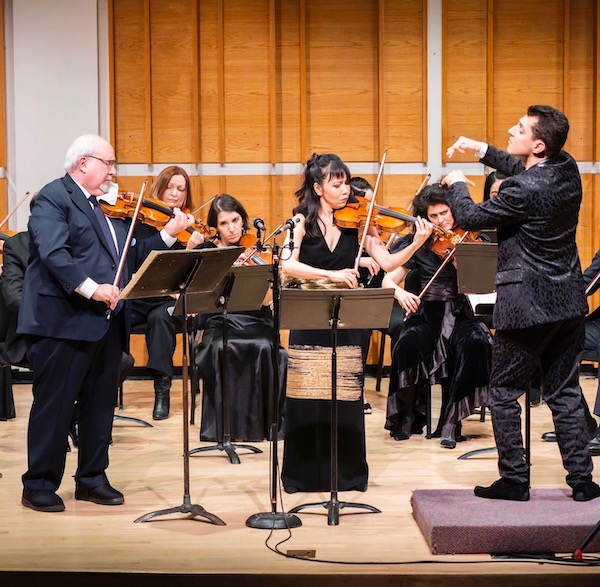Pegasus takes flight in lively debut with Glenn Dicterow

An orchestral startup with big dreams made its New York City debut Saturday night on a modest scale–just 19 string players on the stage of Merkin Concert Hall performing familiar works of Bach and Tchaikovsky, plus a world premiere.
The ensemble, which styles itself Pegasus: The Orchestra, was ably led by its founder, the pianist and composer Karén Hakobyan, who also contributed the evening’s new piece, Contempo: Bach Recombinant.
Headlining the event was violinist Glenn Dicterow, longtime concertmaster of the New York Philharmonic, who brought an old master’s touch to Bach’s Concerto in D minor for Two Violins, teaming with Pegasus concertmaster Eiko Kano.
The orchestra has scheduled full-fledged symphonic concerts for later in the season, including a Rachmaninoff concerto marathon with five piano soloists in Alice Tully Hall next May. Its social ambitions are as lofty as its musical ones, to judge from a mission statement in the program that spoke of artistic freedom, advocacy of music in schools and community, and “promoting humanity and equality.”
On Saturday, however, it was enough just to give a lively account of Bach’s concerto and Tchaikovsky’s Serenade for Strings, Op. 48, and introduce Hakobyan’s intriguing new piece.
Inspired by Bach’s Double Concerto, and subtly quoting it, Contempo: Bach Recombinant—the composer-conductor evidently likes titles with a colon in the middle—was a brief but eventful piece that functioned in this concert as a kind of prologue to the Bach work.
By his account in the program, the composer aimed to combine his Armenian “musical DNA” with that of Bach, while showcasing the Pegasus musicians with brilliant solos and playing divisi, i.e., divided into subsections.
Perhaps not every listener spotted the “Armenian tetrachordal scale system” promised by the composer, but there was no mistaking the feeling of musical fragments (including the Bach quotation) “recombining” into a sinewy string texture, driven by concertmaster Kano’s urgent violin solo.
The music built to a fortissimo climax in vibrant tremolando before giving way to a series of solos stepping down through the sections, first violin to double bass. The piece closed quietly and rather open-endedly, as if expecting Bach’s concerto to begin immediately.
Instead, there were the usual bows and exits and entrances and bows, plus brief remarks from the stage by the conductor, before the Bach performance could get under way. It proved worth waiting for, however, as Hakobyan led a bracing, rhythmically alive rendering of the opening Vivace, with Dicterow giving a master class in poised execution and natural phrasing that fellow soloist Kano and the other players did their best to match.
Alert to Bach’s marking “Largo ma non tanto,” Hakobyan put a lilt under the second movement’s slow three-to-a-bar that gently boosted the soloists’ soaring lines. Unlike many conductors, he led the persistent long-short, long-short rhythm exactly in time, resisting the temptation to shorten the long beats.
The Largo theme’s return near the end was as beautifully played as the first time, but one felt the need for a change of atmosphere at this point, a feeling of parting, not just “second verse, same as the first.”
In the Allegro finale, Hakobyan and his players punched out an incisive ritornello and snappy answers to the soloists, while Dicterow and Kano played an exhilarating game of stretto tag. While his youthful colleagues poured on the energy, Dicterow the silver-haired pro seemed to make it all happen with a few flicks of the bow.
The fervent opening pages of Tchaikovsky’s Serenade benefited from that same youthful élan, as hair on strings produced a big, eager sound. The ensuing Allegro moderato, however, could have been a bit more moderate; all that energy produced a driven, edgy feeling that didn’t really suit Tchaikovsky’s balletic style.
The Valse slowed and paused in all the right places, yet it too sounded a bit driven overall. The group’s tonal limitations were again evident, as they produced a bright, present, Bachian sound where something more velvety was called for.
The ensemble’s playing in the Élégie was expressive on the bar-by-bar level, but it would have helped if Hakobyan had led them on a longer line, so that the movement’s forte climaxes meant something. But one welcomed the shift to a more shadowy tone color for the meditative theme’s final return.
The staccato Russian theme of the Finale was a toe-tapper, but its smart rhythm came unglued in the legato second theme, which was played conspicuously out of time. However, the crisp stretti of the development were a delight, as was the accelerando coda.
Hakobyan and Pegasus: The Orchestra topped off a lively, successful concert with Grieg: The Encore—a merrily chugging rendition of the Praeludium from that composer’s Holberg Suite, Op. 40.
Kaufman Music Center presents New York Philharmonic Ensembles in chamber music by Mozart, Taffanel and Tchaikovsky, 3 p.m. Sunday in Merkin Concert Hall. kaufmanmusiccenter.org/mch; 212-501-3330.